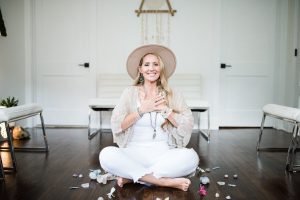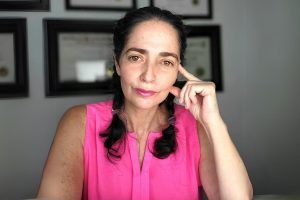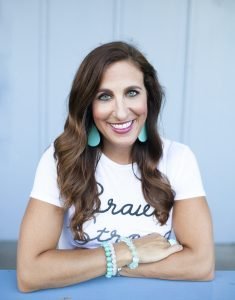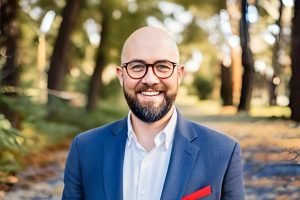Last updated on July 15, 2022
Inspired by her own experience as a new mom, Danielle LaSusa, PhD., helps new and expectant mothers through her coaching practice in Oregon. We hope you enjoy this interview!
Coaching Focus: I’m a Philosophical Coach, helping new and expectant moms grapple with what it means to make a person.
Location: Portland, Oregon, USA
Connect: You can find Danielle online at her website, as well as on Instagram, Facebook, and Mighty Den.
Tell us about your journey as a coach.
I started my career earning my Ph.D. in philosophy and planned to simply teach at a university. But, life does not always go according to plan.
In 2015, when my first child was three months old, I was hospitalized with postpartum psychosis. I’d moved across the country with my husband and planned to take a year off from teaching to have my first baby and write a book. Instead, my entire identity unraveled.
After a year of crying on therapists’ couches, thinking my philosophy career was over, I remembered a training I’d done years before in “philosophical counseling.” I realized that philosophy offers a solid foundation for helping people think clearly, choose wisely, and live intentionally. Starting a coaching practice was the only thing I could think to do that didn’t make me want to cry every day.
I made a website and got my first clients through Psychology Today. Initially, I didn’t want to brand myself as a “mommy person.” I didn’t care about crafts or lunchboxes. Instead, I wanted to talk to other women about how motherhood was giving birth to a new human consciousness. It shook my identity and my sense of meaning to the core. There seemed to be no space to talk about motherhood this way. So, eventually, I decided to make one.
I now teach a course called “The Meaning of Motherhood” and work with clients one-on-one. For many women, motherhood is an existential crisis, and we should treat it that way.
We want to destigmatize talking about money, including how much coaches make. Would you please share with our readers any relevant revenue figures from your business?
I’ve always done coaching part-time. When I started, I was also teaching at a local college and parenting my then-one-year-old.
My first year, I made $18,000 in revenue. My second year, I stopped the college teaching gig about halfway through the year and made $28,000. My third year, the pandemic hit, I restructured my offerings to packages and programs, and I brought in $45,000. In 2021, it was $60,000, and in 2022, I’m projected to make $80,000.
I do coaching about 20 hours a week and spend the other time writing (I’m working on a memoir) and spending time with my daughter. It’s a pretty charmed life, and I feel incredibly lucky to have it.
What courses, programs, or certifications have you done? Would you recommend them, and for whom?
Well, I have a Ph.D. in Philosophy and a Graduate Certificate in Women’s Studies from Temple University. I got my certification in Philosophical Counseling from the American Philosophical Practitioners Association (APPA). That weekend of training in New York City was an introduction to the idea of philosophical counseling, though I found myself craving more ongoing support and mentorship. I had to figure it out myself as I went along.
Luckily, a program for just that sort of ongoing support is currently in the works, so those who do that APPA training now will have more resources and a more organized network of other practitioners to lean on and learn from.
I also took a “solopreneurship” business course at Portland Community College, which was enormously helpful in choosing a niche and gaining confidence in my business acumen.
What advice or perspective might you give to a new coach trying to get her first clients? Any advice they should ignore?
For me, the best advice is to remember that this is a relational business. The clients are much more likely to work with you—especially if you are charging a significant amount of money—if they know you or they trust the recommendation of someone who does.
That’s why I do free 90-minute Connection Conversations with all my prospective clients. They need time to get to know me, and I need to get to know them. Those conversations may result in someone working with me right away, or maybe they’ll come back in two or three years, or maybe they’ll tell their friend about me. In any case, I’m building a network of people who know me and my work.
If I were just getting started, here’s what I’d do, (and here’s what I tell those of my clients who are also coaches):
Create a Coaching Project for yourself as a way to celebrate your launch. For example, you’re gifting 15 people in your community each a 90-minute conversation in 30 days, or whatever makes sense for you. Treat these as practice coaching sessions. They should stand alone as helpful conversations for those who sign up. Spend the first 60-75 minutes focused on coaching, and the last 15-30 minutes talking about what it would look like to work with you further. Then simply ask if this person wants to keep working together. Some percentage will say yes, and voilá—you have your first clients.
Look around at the relationships you already have and let those people know what you are doing. You need not apologize for your work or for inviting people to have a conversation with you. If you really believe in your work, and you offer it as a tool and a resource to those you really think you can help, it doesn’t feel smarmy, or even like “sales.” It feels like an honest exchange in which both parties are getting an enormous benefit. It feels a bit like magic.
What are your thoughts on “choosing a niche” as a coach?
It’s so, so important to choose a niche. A niche helps people understand whom they should send to you. When I was just a “Philosophical Coach” who helped people who liked philosophy, I got a lot of, “Oh, that’s interesting.” But when I say I help new and expectant moms with the existential crisis of motherhood, people almost always respond with “I should send my friend/sister/daughter/etc. your way.”
In choosing a niche, I think the most important thing to ask yourself is, “Whom do I want to serve? What does that person do, like, care about?” Look at your own passions and past, and choose something that feels meaningful to you.
As just a general Philosophical Coach, I found that I often attracted young men who’d studied philosophy in college, thought themselves quite smart, and wanted to intellectually spar with me. I found this tiresome and boring. I found that when I focused on serving moms, I was having conversations that felt much more satisfying, emotionally meaningful, and resonant for both them and me. That has produced better results, more referrals, and a flourishing practice.
What books have significantly influenced your life? What are your key takeaways from these books?
Oh, god. This is a dangerous question for an academic. So many.
- Jean-Paul Sartre’s Being and Nothingness taught me that while we can’t control what happens to us, we can control the meaning we make of what happens to us.
- Patrick Bresnan’s Awakening: An Introduction to the History of Eastern Thought taught me about Hinduism, Buddhism, and Taoism, which have influenced my life ever since.
- This Bridge Called My Back: Writings by Radical Women of Color by author taught me about my position as a white woman in a white supremacist, capitalist patriarchy.
- Milan Kundera’s The Unbearable Lightness of Being taught me about beauty, motifs, and freedom.
- Virginia Woolf’s To the Lighthouse taught me about time, decay, and longing.
- Jen Sincero’s You Are a Badass taught me to take myself and my stories less seriously.
- Marshall Rosenberg’s Nonviolent Communication taught me how to identify my feelings and needs, and how to ask for help in getting them met.
- Kristin Neff’s Self-Compassion: The Proven Power of Being Kind to Yourself taught me how to be nice to myself.
I could go on and on. I read or listen to about 40 books a year.
If you received an extra $10,000 to spend on your business, how would you spend it and why?
I almost always spend money on hiring help, in the form of coaching, retreats, or administrative work. I guess I would hire folks to help me do those things that have been on the back burner for a while: update my website, organize my systems more efficiently, and do an audit to help streamline my business.
Either that or I would take six weeks off just to focus on writing my memoir about my experience with postpartum psychosis.
What are some of your favorite affirmations, mantras, thoughts, and/or journal prompts currently? Why?
One exercise I do with my clients is to identify their two keystone values. I’ve done this myself, and I settled on wisdom and courage as being most important for me.
Wisdom means lots of things to me—it is that knowing place, the source of intuition, that comes from and through my body; it is grounded and without story; it is my wisest self. Courage has been such an important value for me to cultivate. If I want to have a business, a voice, a life that is as big and as impactful as I dream, I have to do things that scare me nearly every day.

I come back to these values again and again, reminding myself: wisdom and courage, wisdom and courage.
I also love Elizabeth Gilbert’s quote “Turn your face stubbornly toward the light and keep it there,” and I think of heliotropism: the phenomenon of plants turning toward the sun.
When you feel overwhelmed, stressed, or have lost your focus or motivation, what do you do?
Yoga, read, journal, cry, run, talk to my therapist or coach. Mostly, I just tell myself over and over that this is part of the process. This time has something to teach me, and I will come through it. Some times of life are more active, some times are more reflective, some times are for rest. They all are necessary.
Do you have any examples of how a “failure” set you up for later success?
My entire business is the result of a failure. In that experience with postpartum psychosis, the bottom dropped out of my life, but it also felt like the top expanded, and now I live in a much larger and wider space. I have so much more range for empathy, compassion, understanding, and courage. It really felt like a death and rebirth. Although it was horrific and I wouldn’t wish it on anyone, I’m also incredibly grateful, and I wouldn’t trade it.
Do you have any embarrassing (at the time) stories from your work as a coach? Or a time when putting yourself out there really paid off?
I had an essay about philosophy and motherhood published in The New York Times in January of 2021. The idea of sending my writing to an editor at the Times scared the bejeezus out of me. But, as I said earlier, I’ve really committed to cultivating courage, so I went ahead and sent the email, and lo, they said yes. That publication brought me the interest of a literary agent in my work. I have dreamed of writing and publishing a book since I was about six years old, and I now have someone who may actually help me make that happen.
If you could put a message on a huge billboard—getting a message out to millions—what would it say and why?
“Hope is not something you feel; it’s something you choose.“
(As far as I know, that’s my quote 🙂 )
Is there anything else you’d like to add?
For any mothers out there who feel like becoming a parent has shaken your sense of who you are and what you care about so deeply that you don’t even recognize yourself anymore—you are not broken, you are not crazy, and you are not alone. You can learn to mourn the self that is gone, get to know this new self, and learn to love her deeply. Reach out to me if you want to chat.
The Life Coach Magazine staff is your team for high-quality content on topics from personal development, to coaching tips, to how to grow your coaching business.










Be First to Comment